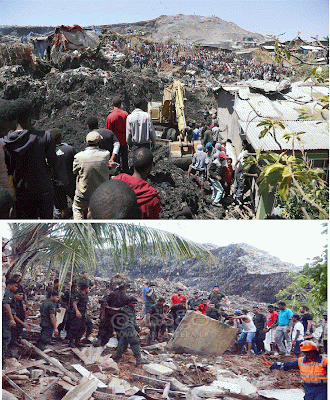Such disasters are often vulnerable people will live in countries ruled by politicians bankrupt.
At least 16 people, including four children, have died after a huge rubbish dump collapsed on to their homes in Sri Lanka.
The 300ft-high (91m) pile had shifted after floods and a fire, and subsequently collapsed on Friday.
At least 40 homes on the edge of the dump were destroyed, with four children aged between 11 and 15 killed.
There had been concerns over the safety of the site in Colombo, with residents demanding it be cleared.
The AFP news agency said about 800 tonnes of waste were added to the Meethotamulla dump every day, and that the government had planned to remove it.
Emergency officials told the BBC that up to 20 people may remain buried in their houses, with the Sri Lankan army now co-ordinating the recovery.
One disaster emergency official told AFP the death toll would have been higher had many people not left their homes after the fire at the dump, hours before the collapse.
Rubbish dump landslide kills 35 outside Ethiopian capital Addis Ababa
The death toll has risen to 35 after a landslide swept through a massive rubbish dump on the outskirts of Ethiopia's capital.
Addis Ababa city spokeswoman Dagmawit Moges says most of the dead are women and children, and more bodies are expected to be found in the coming hours.
One resident says about 150 people were there when the landslide occurred on Saturday night.
The cause of the accident was not immediately clear, but residents say dumping of rubbish had resumed there in recent months.
Hundreds of people are believed to be at the landfill every day scavenging items to make a living. Others live there in makeshift homes.
An Associated Press reporter saw four bodies taken away by ambulances after being pulled from the debris. Elderly women cried, and others stood anxiously waiting for news of loved ones. Six excavators dug through the ruins.
"My house was right inside there," said a shaken Tebeju Asres, pointing to where one of the excavators was digging in deep, black mud.
"My mother and three of my sisters were there when the landslide happened. Now I don't know the fate of all of them."
The resumption of rubbish dumping at the site in recent months is likely to have caused the landslide, resident Assefa Teklemahimanot said.
The dumping had stopped in recent years, but it resumed after farmers in a nearby restive region where a new rubbish landfill complex was being built blocked dumping in their area.
"In the long run, we will conduct a resettling programme to relocate people who live in and around the landfill," the Addis Ababa mayor said.
Around 500 waste pickers are believed to work at the landfill every day, sorting through the debris from the capital's estimated 4 million residents. City officials say close to 300,000 tonnes of waste are collected each year from the capital, most of it dumped at the landfill.
Since 2010, city officials have warned that the landfill was running out of room and was being closed in by nearby housing and schools.
City officials in recent years have been trying to turn the garbage into a source of clean energy with a 120 million dollar investment. The Koshe waste-to-energy facility, which has been under construction since 2013, is expected to generate 50 megawatts of electricity upon completion.
Ethiopia, which has one of Africa's fastest growing economies, is under a state of emergency imposed in October after several months of sometimes deadly protests demanding wider political freedoms.












No comments:
Post a Comment